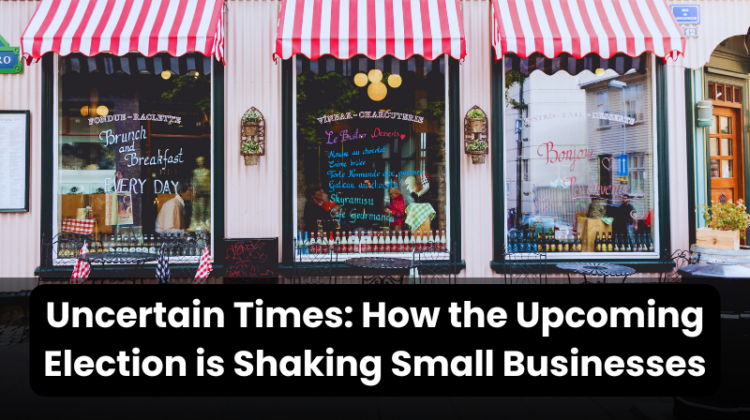
As the United States inches closer to the presidential election on November 5th, 2024, small business owners across the country are feeling a growing sense of unease.
The National Federation of Independent Business (NFIB) recently reported a significant drop in their Small Business Optimism Index, which fell by 2.5 points to 91.2 in August.
How Will Elections Impact Businesses?
________________________________________________________________________
- Small business confidence falls 2.5 points to 91.2 in August.
- Inflation remains a top concern, with 24% of owners citing it as their biggest problem.
- 40% of small businesses report unfilled job openings, up 2% from July.
________________________________________________________________________
This decline has effectively erased all the gains made in July, painting a picture of increasing uncertainty on Main Street.
At the heart of this uncertainty lies the upcoming election.
Many business owners are apprehensive about potential policy changes that could affect their operations.
This political anxiety is compounded by persistent economic challenges, chief among them being inflation.
Despite a slight decrease in the number of owners raising prices, inflation remains the top concern for 24% of small business owners.
The ongoing struggle with rising costs is putting pressure on both business expenses and consumer prices.
The ripple effects of these concerns are evident in the pessimistic outlook many owners have for their sales.
The NFIB survey revealed a sharp decline in sales expectations, with more owners now anticipating a decrease rather than an increase in sales.
This gloomy forecast is mirrored in profit trends, which have hit their lowest point since March 2010.
For many small businesses, making ends meet is becoming increasingly challenging.
Adding to these financial worries is the ongoing difficulty in finding qualified workers.
The labor shortage continues to be a significant hurdle, with 40% of small business owners reporting unfilled job openings in August.
This issue is particularly acute in sectors like construction, where a staggering 60% of businesses are grappling with vacant positions.
Transportation and manufacturing companies are facing similar hiring challenges, highlighting a widespread problem across various industries.
Bill Dunkelberg, an expert at NFIB, summed up the situation succinctly: “The mood on Main Street got worse in August.”
He warns of potential volatility in the coming months, especially as the election draws nearer.
Despite these challenges, there’s a glimmer of hope on the horizon.
About 24% of small business owners are planning to invest in their companies over the next six months, a slight increase from July.
These investments could range from purchasing new equipment to expanding operations, signaling that some businesses are still looking towards growth.
However, the path to expansion is not without obstacles.
High interest rates are making borrowing costly, and the uncertain economic landscape is causing many owners to hesitate on long-term commitments.
The combination of expensive financing and an unpredictable future is forcing many to adopt a cautious approach to investment.
As the election approaches, small business owners find themselves in a delicate balancing act.
They’re striving to stay nimble and adapt to economic changes while also preparing for potential post-election shifts.
The resilience of these businesses, which form a crucial part of the U.S. economy and job market, is being put to the test.
The NFIB survey serves as a barometer for the health of small businesses in America.
The current reading suggests stormy weather ahead, with owners navigating through a complex mix of political uncertainty, economic pressures, and operational challenges.
How these businesses weather this storm and what unfolds after the election could have far-reaching implications for the broader economic landscape of the United States.
As Main Street braces for what may come, the determination and adaptability of small business owners will be crucial in shaping their path forward.
While the road ahead appears challenging, the entrepreneurial spirit that drives these businesses remains a powerful force in the face of adversity.

Leave a Reply